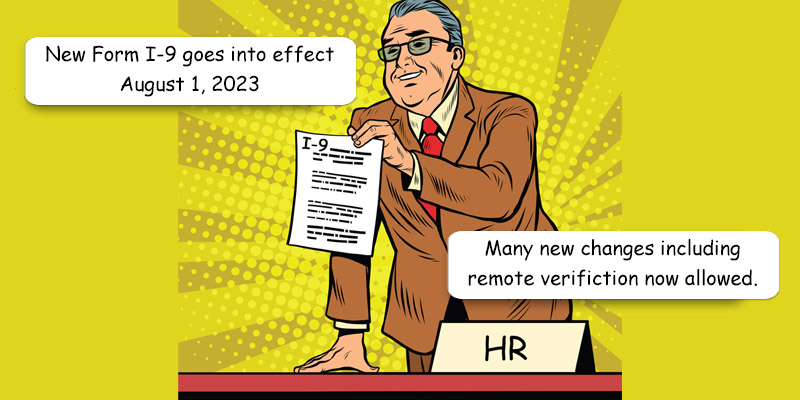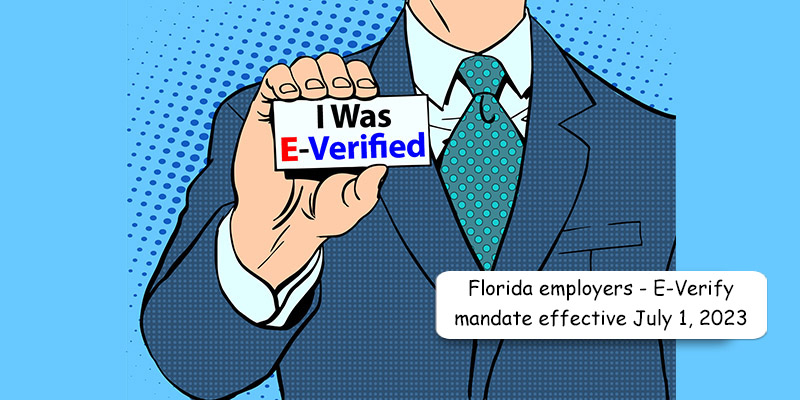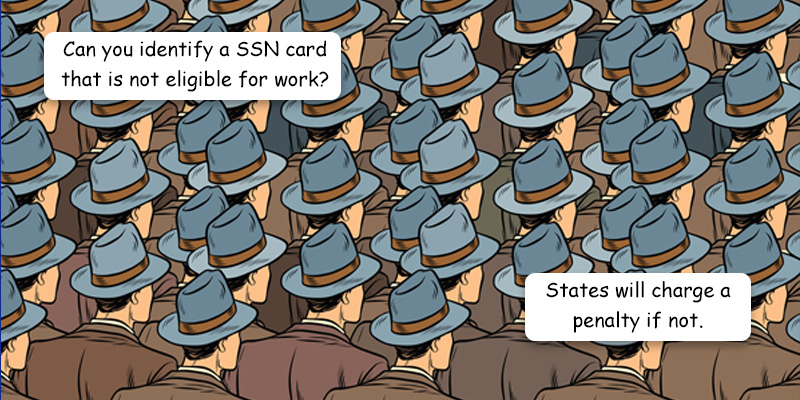On August 1, 2023, the U.S. Citizenship and Immigration Services published the latest version of Form I-9. The new version can be downloaded here: https://www.uscis.gov/i-9. Employers should begin to use this new form immediately, and starting November 1, 2023, ONLY this new version will be allowed. If your employees use PayMaster HCM to complete the Form I-9, we will update to the new version in the coming weeks. There are many big changes with this version. Wording has been changed from ‘alien’ to ‘noncitizen,’ which I always thought was weird in the first place, and the form was redesigned to…
Posts published in “Employee Management”
Florida Governor Ron DeSantis signed Florida’s Senate Bill 1718 into law on May 10, 2023. This bill has a broad purpose to obstruct the flow of illegal immigration in the state and imposes some of the toughest penalties in the country. It ‘enhances’ the crime of human smuggling, which is a good thing, but imposes a new rule for employers in the state. Effective July 1, 2023, private employers with 25 or more employees, and public employers, are now required to use the federal E-Verify system to verify employment eligibility of ALL new hires. There is NO requirement to verify employees who began employment prior to that effective date. So…
There has been an increase in biometric privacy class action lawsuits, which should bring concerns to employers. First and foremost, what is biometric data? Biometric data refers to any data that identifies or is related to an individual’s physical, physiological or behavioral characteristics, such as fingerprints, iris scans, facial recognition, hand recognition, voice recognition, DNA or any other unique biological information. With the rise of biometric technologies, concerns over the privacy and security of biometric data have become increasingly important. Securing an employee’s biometric data should be held in the same regard, if not higher, as other data, such as…
Jury duty. It is something that many people dread being called for, but being summoned and responding is a civic duty and an honored privilege, critical to our judicial system. That can be an article all to itself, but today we will cover how the employer handles calls to jury duty by their employees. Employers are prohibited by state laws from terminating or penalizing an employee, in any way, who is called to serve on jury duty. Being laid off would certainly dissuade people from serving, so the states provide a bit of protection to the employee. If the employee…
Overtime. It is a subject that you may think you know well, but do you? It is not always a simple matter of paying the employee “time and a half” for any hours worked in excess of 40 hours in a workweek. There is much more to take into consideration, and while this article is not intended to cover every scenario out there, we will touch a number of bases. What we will not cover, this time around, is who may be exempt from overtime. Let’s start with the federal law, where the overtime provisions are contained in the Fair…
Over two decades ago, as a result of 9/11, President G.W. Bush signed the Uniting and Strengthening America by Providing Appropriate Tools Required to Intercept and Obstruct Terrorism (The PATRIOT) Act of 2001 into law. One purpose of the PATRIOT Act is to deter and punish terrorist acts in the United States and around the world by putting in measures to prevent, detect and prosecute money laundering and financial terrorism. One may ask themselves, what does this have to do with payroll? Plenty. The Act states that all individuals and organizations within the United States are responsible for ensuring that…
The last time I wrote about Social Security Numbers (SSNs) over four years ago, it was a fun and educational piece about the history of the SSN. You can check it out at this link: https://blog.paymaster.com/a-history-and-education-about-the-ssn/ These days, the SSN has become more important than ever, and it is of utmost importance to get it right. Of course, you should always get the SSN right for compliance with the Department of Homeland Security and the IRS, but that does not always happen. The filing of state employment and unemployment taxes has become more sophisticated over the recent years by utilizing…
All private employers, even Old MacDonald, who are subject to Title VII of the Civil Rights Act of 1964 (as amended by the EEO Act of 1972) with 100 or more employees and have establishments located in the 50 states or DC are required to file the Standard Form 100 (aka EEO-1) each year. The due date changes each year, and is often extended. As of the time of this article, the 2021 filing is due by Tuesday, May 17, 2022. This includes state and local governments, primary and secondary school systems, institutions of higher education, Indian tribes, and tax-exempt…
We are finally getting back to a state of normalcy, so the experts say. Some are going back to their offices, others are getting back to their busy business travel schedules, while others have found that productivity has not been negatively affected by being remote and have made the decision to stay that way. One of the things people have enjoyed about working from home is having more time with their pets. Over the past two years, pet adoptions have increased tremendously for a litany of reasons. Some people were alone and needed companionship while others finally had the time…
Whether you call it ‘earned wage access’, ‘instant pay’, ‘on-demand pay’, ‘pay on-demand’ or ‘wages on-demand’, this employee benefit is one of the fastest growing employee wellness programs in the market. Nearly 3 out of every 4 U.S. employees (72%) want access to their wages before their pay day, according to The UKG Workforce Institute study. With the increasing demand, there’s been a massive explosion in the number of companies offering earned wages on-demand to employees. You will find many employment ads that state “work today, get paid tomorrow” in their job offering. It is becoming a competitive advantage for…










